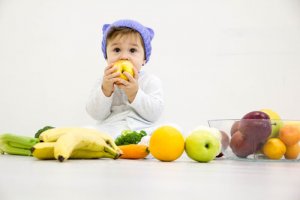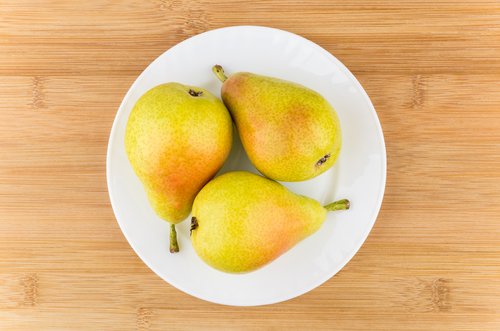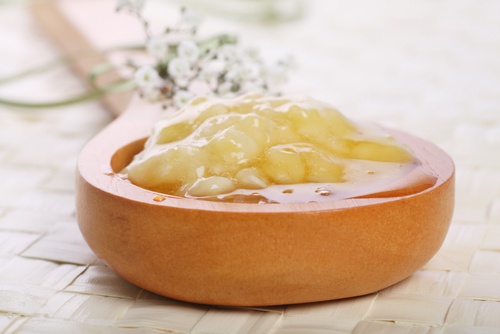Which Are Safe Fruits for Babies to Eat?


Reviewed and approved by the pedagogue in physical education and nutritionist Elisa Morales Lupayante
Having a baby is wonderful, but your caring can become a source of stress. Seeing them so small and so fragile, it’s hard for you to make decisions that affect them. They cannot communicate if something hurts them nor do they have the tools to refuse anything. So, determining a list of safe fruits for babies to eat is essential.
Taking this into account, it is normal that, sometimes, we are assailed with doubts about what fruits babies can eat without putting them in danger at any time.
However, before that, we have to know when to start. It would be ideal to do so after 6 months.
We will have to prepare fruits in juice or in porridge to feed them to them little by little.
Thus, it is best to start with juices, although it is possible that his initial reaction is rejection.
We should not worry: we will give him a little bite from time to time for a few days and, if he still does not want it, we will try a puree and follow the same procedure.
Little by little, he will adapt to its flavor and texture. We must bear in mind that, until this moment, he has only tasted milk: everything needs time.
It is also advisable to think about allergies. At these ages, a crisis of this kind can be very serious, so you have to start with the fruits that present less risk.
To that effect, we must avoid kiwi, strawberries, melon and tropical fruits, for now.
Remember that both the juices and the porridges should be made with only one fruit, so that the process is gradual and safe.
Also, if allergy symptoms appear, you will know what the source is.
Discover what fruits a baby can eat
Apple

In addition to its sweet taste, it is one of the softest fruits, so the risk of intolerance is minimal.
Apple’s benefits for babies are very significant.
- For starters, it has the fiber that children need so much in these moments. In this early period, babies’ digestive system suffers when we change their diet, so constipation is a very common condition.
- On the other hand, it is rich in calcium, potassium and iron, as well as vitamins A, B, C and E.
- What is more, like all foods of this type, it also offers the sugar they need to have energy.
See also:
Enjoy the Benefits of Apples With These 9 Delicious Recipes
Pear

Like apples, there is hardly any possibility that your baby will have an allergic reaction.
- They have a high content of minerals: potassium, magnesium and calcium.
- On the other hand, they provide us with extra energy with their slowly digested carbohydrates, while strengthening your immune system with their contribution of vitamin C.
- As if this were not enough, they also consist of folic acid and natural antioxidants.
- To finish, pears also stand out for their fiber content and polyunsaturated fatty acids.
Apples and pears are the safe answers for those who are wondering what fruits a baby can eat.
As a sign of its mildness, it is enough to realize that even adults choose them when we have a stomach problem.
We recommend you read:
A Delicious and Filling Pear, Chia and Oat Smoothie for Weight Loss
Bananas

Before preparing any recipe with banana, remember to remove the fibers that they usually have.
Once you have done this, you have at your disposal a great food for your baby. The simplest form of consumption is as compote or banana porridge.
As you know, it is a fruit that is a source of carbohydrates. Therefore, it is recommended so that he will have energy and can play everything you want.
However, it is preferable that he eats them mid-morning or at lunch. So, the body will absorb all of its fiber, potassium and minerals without gaining more weight than desired.
It is important that we get our children used to eating fruit from a young age, not only to take advantage of their nutrients, but because it will help them avoid others that are very harmful to them.
Fruits provide a large amount of natural sugars, an element that our body demands.
Consequently, when we do not eat fruit, we resort to other types of food, such as industrial sweets, which do nothing more than damage our bodies.
Therefore, the desirable thing is to get them used to fruit and away from refined sugars to preserve their good health.
All cited sources were thoroughly reviewed by our team to ensure their quality, reliability, currency, and validity. The bibliography of this article was considered reliable and of academic or scientific accuracy.
- WHO. (n.d.). La lactancia materna exclusiva durante los primeros 6 meses es lo mejor para todos los niños. Organización Mundial de la Salud.
https://www.who.int/mediacentre/news/statements/2011/breastfeeding_20110115/es/ - Beltrán Sorolla, E. (2018). Recomendaciones de la alimentación en la primera infancia: evaluación del seguimiento en la alimentación de niños de guarderías de gestión privada del municipio de Lleida. https://repositori.udl.cat/bitstream/handle/10459.1/66078/ebeltrans.pdf?sequence=1&isAllowed=y
- Wilms, E., Jonkers, D. M., Savelkoul, H. F., Elizalde, M., Tischmann, L., de Vos, P., … & Troost, F. J. (2019). The impact of pectin supplementation on intestinal barrier function in healthy young adults and healthy elderly. Nutrients, 11(7), 1554. https://pubmed.ncbi.nlm.nih.gov/31324040/
- Bucher, A., & White, N. (2016). Vitamin C in the prevention and treatment of the common cold. American journal of lifestyle medicine, 10(3), 181-183. https://pubmed.ncbi.nlm.nih.gov/30202272/
- Nutrition Data. (n.d.). Bananas, raw Nutrition Facts & Calories. SELF Nutrition data. https://nutritiondata.self.com/facts/fruits-and-fruit-juices/1846/2
This text is provided for informational purposes only and does not replace consultation with a professional. If in doubt, consult your specialist.








